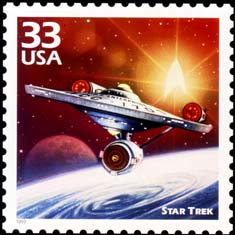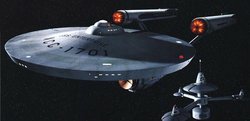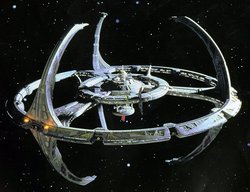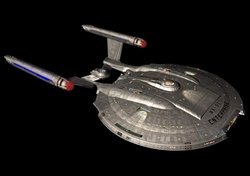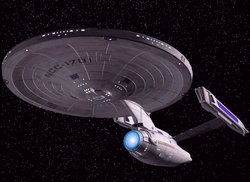Star Trek
|
|
Star Trek collectively refers to six science fiction television series spanning 726 episodes, ten motion pictures, and hundreds of novels, video games, and other works of fiction all set within the same fictional universe created by Gene Roddenberry in the early- to mid-1960s. It depicts an optimistic future in which humankind has overcome sickness, racism, poverty, intolerance, and warfare on Earth; the central characters explore the galaxy, finding new worlds and meeting new civilizations, while helping to spread peace and understanding. Star Trek is one of the most popular names in the history of science fiction entertainment, and one of the most popular franchises in television history.
Television series
Star Trek originated as a television series in 1966 There have been five live action Star Trek series and an animated series, altogether comprising (as of May 2005) a total of 725 individual aired episodes (not including the original unaired pilot) and thirty seasons worth of television.
Star Trek (1966-1969)
Main article: Star Trek: The Original Series
Star Trek debuted on NBC on September 8, 1966. Created by Gene Roddenberry and starring William Shatner, Leonard Nimoy and DeForest Kelley, James Doohan, George Takei, Nichelle Nichols, Walter Koenig it told the tale of the crew of the starship Enterprise from the United Federation of Planets and their adventures "to boldly go where no man has gone before". Initially, it was not successful; ratings were low and advertising revenue was lackluster. However, when threats of cancellation loomed in the show's second season, the show's devoted fanbase conducted an unprecedented campaign, convincing NBC to produce a third season. The last episode aired on June 3, 1969. The series subsequently became phenomenally popular in syndication.
To distinguish this first series from the sequels which followed, it has in recent years become known as Star Trek: The Original Series, abbreviated as ST:TOS or TOS.
Star Trek (1973-1974)
Tas_1701_03.jpg
Main article: Star Trek: The Animated Series
The series was aired under the name Star Trek, but it has become widely known as Star Trek: The Animated Series (or abbreviated as ST:TAS or TAS). It was produced by Filmation and ran for two seasons with a total of twenty-two half-hour episodes. It featured most of the original cast performing the voices for their characters. While the freedom of animation afforded large alien landscapes and exotic lifeforms, budget constraints were a major concern and animation quality was poor. A few episodes are especially notable due to contributions from well-known science fiction authors. The series is not considered to be canon, which has caused controversy among some fans. However, the episode "Yesteryear" is considered a partial exception concerning the events depicted in Spock's youth. In addition, elements of the animated series have worked their way into canon, such as Kirk's middle name, "Tiberius," first revealed in TAS and made official in Star Trek VI: The Undiscovered Country. Star Trek: Enterprise has also incorporated several TAS concepts into canon.
Star Trek: Phase II (1978; unproduced)
Main article: Star Trek: Phase II
Star Trek: Phase II was set to air in 1978 as the flagship series of a proposed Paramount television network, and 12 episode scripts were written before production was due to begin. This series would have put most of the original crew back aboard the Enterprise for a second five-year mission, save for Spock as Leonard Nimoy did not agree to return; a full-blooded Vulcan named Xon was planned as a replacement, although it was still hoped that Nimoy would make guest appearances. Sets were constructed and several minutes of test footage were filmed. However, partly due to the popularity of the recently-released Star Wars, Paramount decided to make a Star Trek film instead of a weekly television series. The first script formed the basis of Star Trek: The Motion Picture, while two others were eventually adapted as episodes of Star Trek: The Next Generation.
Star Trek: The Next Generation (1987-1994)
NCC_1701-D.jpg
Main article: Star Trek: The Next Generation
Star Trek: The Next Generation (also known, colloquially, as The Next Generation, ST:TNG or TNG) is set nearly a century later and features a new starship (also named Enterprise) and a new crew. It premiered on September 28, 1987 with the two-hour pilot episode "Encounter at Farpoint" and ran for seven seasons, ending with the final two-part episode "All Good Things..." on May 29, 1994. The show gained a considerable following during its initial run. Even during its initial run, the show was produced solely for syndication.
Star Trek: The Next Generation was the highest rated of all the Star Trek series, and was the number one syndicated show during the last few years of its original run. Many fans, both casual and "hard-core" often treat The Next Generation as a kind of Golden Age of Star Trek, primarily because of its relatively widespread acceptance and viewer base (as opposed to later series).
Star Trek: Deep Space Nine (1993-1999)
Main article: Star Trek: Deep Space Nine
Star Trek: Deep Space Nine (ST:DS9 or DS9) ran for seven seasons. It introduced Avery Brooks as Commander (and later in the series, Captain) Benjamin Sisko, the first African-American in the commanding role of a Star Trek series. It chronicles the events surrounding the space station Deep Space Nine. In the first episode, the crew discovers the presence of a nearby stable wormhole which provides immediate travel to and from the distant Gamma Quadrant. This immediately makes the station an important tactical asset, as well as a vital center of commerce with the largely-unexplored area of space. Deep Space Nine sheds some of the utopian themes that embodied the previous versions of Star Trek, and focuses more on war, religion, political compromise, and other modern issues. Due to its generally darker theme, many fans of the generally light Next Generation failed to return as an audience. This was the first Trek series to be established without any direct input from Gene Roddenberry.
Star Trek: Voyager (1995-2001)
STVoyager.jpg
Main article: Star Trek: Voyager
Star Trek: Voyager (also known as ST:VOY, ST:VGR or VOY) was produced for seven seasons, and is the only Star Trek series to have had a female captain as a lead character. The series follows the adventures of the USS Voyager and her crew, joined by Maquis resistance fighters, who have all become stranded in the Delta Quadrant, seventy-five thousand light-years from Earth. Unless they can find a shortcut, it will take them seventy-five years to return to known space. The finale of the show showed that the starship had in fact made it back to Earth. Captain Janeway, played by the series star, Kate Mulgrew, made a brief cameo appearance in the Star Trek feature Nemesis. Although Voyager's ratings were initially solid, they fell dramatically as the show progressed. It was during this show's run, that the modern "Berman bashing" among some Star Trek fans began to hit its strong stride, coinciding with the growth in popularity of online discussion forums.
Star Trek: Enterprise (2001-2005)
Main article: Star Trek: Enterprise
Star Trek: Enterprise (named simply Enterprise during its first two seasons, and abbreviated as ST:ENT or ENT) is a prequel to the other Star Trek series. The pilot episode, "Broken Bow", takes place ten years before the founding of the Federation, about halfway between the events shown in the movie Star Trek: First Contact and the original Star Trek series. This series depicts the exploration of space by the crew of the Earthship Enterprise, a new NX class starship that is able to go farther and faster than any humans had previously gone. It presents situations not entirely unfamiliar to Star Trek fans, but which allow its characters to face them unencumbered by the experience and rules which have built up over the following years of Trek history. Ratings for Enterprise were never particularly strong, and - like the original series - fan support during its second and third seasons helped keep it on the air, but ultimately the series was cancelled after four seasons.
Motion pictures
Sovereign-2.jpg
A total of ten Star Trek movies have to date been produced by Paramount Pictures.
A common urban myth among fans is that the even-numbered Star Trek films are superior to the odd-numbered Star Trek films. This rule of thumb is most easily applicable to the first few films: Star Trek II and IV are usually at or near the top of the fan favorites, while I and V are usually at the bottom (though I has since received quite a bit of positive reevaluation in the wake of an acclaimed "Director's Edition" revision released on DVD). Some believe that an exception to the "even number" rule is Nemesis, the tenth film, which had the lowest box office proceeds of all ten films and is one of the most criticially derided films of the series, although it sold well when released on DVD in 2003.
As of March 2005, work has begun on a script as a possible basis for an as-yet untitled Star Trek XI. Although American releases of the films were no longer numbered following the sixth film, European releases continued numbering the films.
| No. | Title | Year | Crew | Director |
|---|---|---|---|---|
| I | Missing image Star_Trek_I.jpg The Motion Picture | 1979 | Original series | Robert Wise |
| II | Missing image Star_Trek_II.jpg The Wrath of Khan | 1982 | Original series | Nicholas Meyer |
| III | Missing image Star_Trek_III.jpg The Search for Spock | 1984 | Original series | Leonard Nimoy |
| IV | Missing image Star_Trek_IV.jpg The Voyage Home | 1986 | Original series | Leonard Nimoy |
| V | Missing image Star_Trek_V.jpg The Final Frontier | 1989 | Original series | William Shatner |
| VI | Missing image Star_Trek_VI.jpg The Undiscovered Country | 1991 | Original series | Nicholas Meyer |
| VII | Missing image Star_Trek_VII.jpg Generations | 1994 | Next Generation | David Carson |
| VIII | Missing image Star_Trek_VIII.jpg First Contact | 1996 | Next Generation | Jonathan Frakes |
| IX | Missing image Star_Trek_IX.jpg Insurrection | 1998 | Next Generation | Jonathan Frakes |
| X | Missing image Star_Trek_X.jpg Nemesis | 2002 | Next Generation | Stuart Baird |
An uncertain future for the franchise
Predictions of the demise of Star Trek are nothing new. As early as 1993-1994, when Star Trek: Deep Space Nine failed to generate the high ratings of its predecessor, magazines such as Entertainment Weekly predicted the end of the franchise. The near-cancellation of Star Trek: Voyager in the mid-1990s led to more such predictions. Enterprise was widely reported in the media to be on the verge of cancellation after each of its first three seasons.
However, due to the cancellation of Enterprise and the poor showing of the 2002 film Nemesis, executive producer Rick Berman has stated that Paramount intends to rest the franchise (film and television) for at least three years.
Many Trek fans want Berman and the other executive producer Brannon Braga to be replaced. Babylon 5 creator J. Michael Straczynski, former Star Trek writer Ronald D. Moore, and current Enterprise executive producer Manny Coto have been suggested as possible replacements. In an ironic twist to the fan-based efforts to bring back Trek in the 1960s and 1970s, there are groups of fans who feel that the concept has run its course and who are actively seeking the end of Star Trek.
Reruns of The Next Generation and Deep Space Nine are aired regularly on Spike TV in the United States, while TOS, TNG, DS9 and Voyager air daily in Canada on Space: The Imagination Station, which has also purchased Enterprise for daily rebroadcasts starting in the fall of 2005.
Cast members and fans have suggested that even if there are no further Star Trek series or movies, the franchise may continue in television movies, mini-series, specials, and other forms of media.
Future sequels to the original series
There is some desire among fans to bring back the character of Captain Kirk, as played by William Shatner, to give him a more dignified end than that shown in Star Trek: Generations.
George Takei and fans have made frequent attempts to convince the studio to create a series based on Captain Sulu's voyages on the Excelsior, but, despite support from fans, it has enjoyed little success. Sulu and the Excelsior originally appeared in the film Star Trek VI: The Undiscovered Country as well as in an episode of Star Trek: Voyager ("Flashback") but this did not lead to a new series. Sulu later appeared in the video game Star Trek: Shattered Universe set in the Mirror, Mirror alternate universe.
Future sequels to The Next Generation
Next Generation stars Marina Sirtis, Patrick Stewart, and Jonathan Frakes have suggested that no more TNG films will be produced; Brent Spiner is also no longer interested in reprising the character of Data. However, Spiner portrayed Arik Soong, an ancestor of the creator of his character Data, in Enterprise's fourth season, and both Sirtis and Frakes reprise their TNG roles for the Enterprise finale. Spiner reprises his role as Data in a speaking, off-screen part in the finale.
Continuation of Enterprise
In November 2004, Paramount announced that it would be offering the first four seasons of Enterprise, which aired its final episode on May 13, 2005, in television syndication as well as on DVD in 2005. The first season DVDs were released in United States on May 3rd, 2005.
There is some consensus among Star Trek fans that the fourth and final season of Enterprise was far superior and more "Trek-like" to the previous three seasons, and that continuation of the program under the new writing style would have stood a chance of acquiring better ratings during a fifth season.
A campaign by Enterprise fans was mounted to have the show aired on the Sci-Fi Channel, which was rumored to be interested in the show (although TV Guide reported otherwise). Berman, however, stated that Paramount is not interested in shopping the show around to other networks.
One campaign, Trek United, attempted to raise funds to finance a fifth season, raising pledges and cash donations of more than $3.1 million (U.S.) but its proposal which would have seen a fifth season jointly produced by Paramount along with Canadian and British production houses, was rejected by the studio. It has been reported that the decision to cancel Enterprise after its fourth season may have been made by Paramount as early as the 2002-2003 season, while lead actor Scott Bakula has gone on record as stating that management changes at Paramount in 2003-2004 left the Star Trek franchise without strong support at the studio. In April 2005, he claimed that up until 2003-2004 Paramount had actually intended for the cast of Enterprise to become the focus for the next Star Trek film. [1] (http://www.scifi.com/scifiwire2005/index.php?category=0&id=30849)
New feature film
Rick Berman revealed in 2003 that preliminary work had begun on an eleventh Star Trek feature film. Rumors circulated that this film would be a prequel, perhaps titled Starfleet Academy or Starfleet Command, involving Spock, Captain Kirk, and Dr. McCoy played by new actors. Other rumors suggested the film would take place between the events of Enterprise and TOS, perhaps involving the Romulan War and featuring a new cast. However, rumors of such a prequel have circulated several times during the 1990s without result.
In late 2004, Paramount indicated that no plans were in place for a new film, and it was reported that the studio had rejected Berman's idea of a film featuring a new cast and crew, indicating that it preferred a film featuring familiar faces.
In late February 2005, Berman told Variety that pre-production of an eleventh Star Trek film was underway and that screenwriter Erik Jendresen, producer Jordan Kerner, and former Paramount Television president Kerry McCluggage were attached to the project. [2] (http://www.trektoday.com/news/230205_01.shtml) Berman said the film would focus on new characters, rather than any from previous series, and would take place in a time period before the original Star Trek (as Enterprise did before it). Jendresen has since confirmed such reports. However, it is still uncertain whether Jendresen's script will be approved by Paramount executives; in January 2005 it was reported by some websites that the studio had rejected a similar proposal, though Berman denied this. [3] (http://www.trektoday.com/news/180105_01.shtml)
In a May 2005 interview for the UK Star Trek Magazine, Berman stated that he does not expect Trek XI, if it is actually produced, to be released for several years.[4] (http://trekweb.com/articles/2005/05/27/4297698c2c344.shtml)
Video games
In 1998, Viacom entered into an agreement with Activision to produce Star Trek video games. Many games were released under this agreement, but in 2003, Activision filed a lawsuit against Viacom stating that they were not holding up to their end of the bargain because the Star Trek franchise was not as valuable as it once was. Activision cancelled the contract and sought compensation for losses. In March 2005, an agreement was reached and all lawsuits were dropped, but the other terms have been deemed confidential [5] (http://investor.activision.com/ReleaseDetail.cfm?ReleaseID=157785)
In 2004, Perpetual Entertainment announced plans for an MMORPG based in the Star Trek universe. This will be the first game of this type to be based on Star Trek. Currently, the game is tentatively titled Star Trek Online and is expected to be set roughly ten years after the events of Nemesis.
Novels
Pocket Books, current publishers of officially licensed fiction based upon all the series (as well as numerous original Trek series of its own), plans to continue publishing original novels for the foreseeable future.
However, soon after Enterprise was cancelled, the company announced (http://www.trektoday.com/news/220205_01.shtml) that it was halving the number of Star Trek novels it would be publishing, down to only one mass-market paperback per month, plus several trade paperbacks and hardcovers throughout the year. Although book line editors stressed that the decision to reduce the number of books was made a year earlier and was not related to popularity/ratings problems within the franchise, the announcement was seen by some as another indication that the Star Trek franchise is on the wane.
Despite this, however, the company maintains that it has ambitious plans for the line, including (in May 2005) the confirmation that an Enterprise Relaunch series of novels is in the planning stages.[6] (http://www.trektoday.com/news/180505_01.shtml)
Other storylines
Although books, comic books, video games, and other material based on Star Trek are generally considered "non-canon", there are several which deserve mentioning, including a number of fan-made productions set within the Star Trek universe have been created for distribution over the Internet. None of these projects are licensed by Paramount, however the studio has reportedly loosened its stance on allowing them. See Star Trek, other storylines for more detailed information about these productions.
See also
- Star Trek Customizable Card Game
- Society and Star Trek
- Star Trek Further Reading
- List of Star Trek characters
- List of Starfleet ship classes
- Chronological list of Star Trek stories
- Starfleet ranks and insignia
- Comparative Ranks and Insignia of Star Trek
- TOS TrekMuse
- LGBT Characters in The Star Trek Universe
- Wikipedia:WikiProject Star Trek
References
Star Trek may be the most documented entertainment franchise in history. Here are a few of the major reference works related to the production and influence of the franchise.
- The Making of Star Trek by Gene Roddenberry and Stephen E. Whitfield (Ballantine Books, 1968)
- Inside Star Trek: The Real Story by Herbert F. Solow and Robert H. Justman (Pocket Books, 1996)
- Star Trek Memories by William Shatner and Chris Kreski (HarperCollins, 1993)
- City on the Edge of Forever by Harlan Ellison (White Wolf Publishing, 1996)
- The World of Star Trek by David Gerrold (Ballantine Books, 1973; revised edition, Bluejay Books, 1984)
- Star Trek Lives! by Jacqueline Lichtenberg, Sondra Marshak, and Joan Winston (Bantam Books, 1975)
- On the Good Ship Enterprise: My 15 Years with Star Trek by Bjo Trimble (Donning Starblaze, 1983)
- The Making of the Trek Conventions by Joan Winston (Doubleday Books/Playboy Press, 1977)
- Future Perfect: How Star Trek Conquered Planet Earth by Jeff Greenwald (Viking Press, 1998)
- Get a Life! by William Shatner and Chris Kreski (Pocket Books, 1999)
- A Star Trek Catalog edited by Gerry Turnbull (Grosset & Dunlap, 1979)
- The Physics of Star Trek by Lawrence M. Krauss (Basic Books, 1995)
- I'm Working on That: A Trek from Science Fiction to Science Fact by William Shatner and Chip Walter (Pocket Books, 2002)
External links
- http://www.startrek.com - The official Star Trek home page
- http://www.trekology.com - How Star Trek and other sci-fi space adventures persuade audiences
- http://www.memory-alpha.org – Memory Alpha - a Star Trek wiki
| Star Trek | |
| Series: | Movies: |
cs:Star Trek da:Star Trek de:Star Trek eo:Star Trek es:Star Trek et:Star Trek fi:Star Trek fr:Star Trek he:מסע בין כוכבים hu:Star Trek id:Star Trek is:Star Trek it:Star Trek ja:スタートレック la:Star Trek lb:Star Trek nb:Star Trek nl:Star Trek nn:Star Trek no:Star Trek pl:Star Trek pt:Star Trek simple:Star Trek sk:Star Trek sl:Zvezdne steze sv:Star Trek zh:星艦奇航記 zh-min-nan:Star Trek

